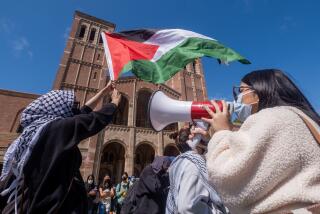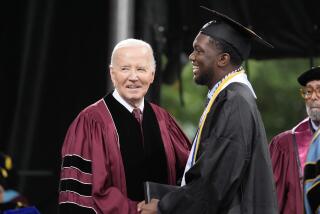At American University, Sympathies Shift From U.S.
For much of its 84-year history, American University in Cairo flew a U.S. flag and attracted students from wealthy families. When demonstrators in the 1977 bread riots stoned symbols of elitism, the university was among their targets.
Today the American flag is gone, hauled down more than two years ago by students supporting the Palestinians. Gone, too, is the public perception that a U.S.-style education and the works of Darwin and Hemingway isolate scholars from the rest of society. Anti-U.S. sentiments inflamed by the Palestinian intifada and the war in Iraq, combined with the growing influence of Islam, have pushed the universityâs 5,000 students into the Egyptian mainstream.
Riot police, once stationed outside the campus to protect students from street protesters, are now there to keep students from breaking out of the campus to join street protests. The day the United States launched its attack on Baghdad, the first demonstrators to reach a planned antiwar rally in nearby Tahrir Square were about 200 students who had charged through police barricades.
âIâve been here 30 years,â said Tim Sullivan, the American provost, âand whatâs new now is that across the depth and breadth of Egyptian society, at all levels, there is a sense of disillusionment and betrayal. People, I think, feel betrayed more by an American president than by America itself, but they tell you, âThis isnât what America is supposed to be.â â
The university, a private liberal-arts institution founded by U.S. businessmen and run by an international board of trustees that is predominantly American, has no connection with the U.S. government and has never been in the business of defending U.S. policy. Its graduates, including the wives, children or grandchildren of three Egyptian presidents, are spread through the top layers of business, government and society.
With a tuition of $12,000, the university still attracts students who represent the elite and have a stake in the system. Half the faculty and 87% of the students are Egyptian, with students from many countries, including the U.S., represented. It is the only English-language university in Egypt and is considered one of the top academic institutes in the Middle East.
But the doubling of enrollment in the 1980s and later the granting of full scholarships to students without financial means brought diversity. And with diversity came a similarity to life beyond campus walls. Many female students started covering their hair with scarves, some male students started challenging books and professors as un-Islamic, and public sentiment started to reflect that on the Arab street.
âEveryone here believes this war is about oil,â said Mohammed Naggar, 19, a business major. âItâs really sad. Itâs sad because of what America has become since 9/11. A lot of us used to want to go there to study or work. You donât hear students saying that now. Besides, we couldnât get visas even if we wanted, because weâre Arabs.â
âI try to tell students,â said Sharif Elmusa, a Palestinian who is director of Middle East studies, âthat many American soldiers they see on TV come from poor families and went into the Army for a job or for money for college. They should show some sympathy. But they donât buy it.â
Thomas H. Bartlett, who was president of the university during the 1967 Arab-Israeli war and who recently returned as interim president for a year, remembers Egyptian President Gamel Abdel Nasser sequestering the university in 1967 and ordering all foreigners out of Egypt. He worries that the war on Iraq will have a greater effect on long-term Arab-U.S. relations than did the Six-Day War.
âThe government gave the impression in â67 Americans were fighting with Israel, and by the time I got to Alexandria to board a ship, the mood was pretty black and very hostile. I saw an Egypt I had never known or imagined. Six months later, when I returned, people knew the government had lied, and there wasnât a hint of hostility toward Americans. Everyone wanted normalcy again, and they were happy to see Americans come back.
âThis time thereâs been a fundamental change in underlying views, and people know whatâs going on,â Bartlett said. âI donât think the attitude will be âAh, all is forgivenâ after the war. Egyptians feel weâve betrayed them, pushed them aside, ignored them. Theyâre angry about Iraq. The result is that people seem to differentiate less between American policy and Americans themselves than they traditionally have done.
âIf ordinary people are feeling this way, the question is how long people will continue to respect American education, American medicine, American culture or believe in what America has always proclaimed about freedom and individual liberties.â
More to Read
Sign up for Essential California
The most important California stories and recommendations in your inbox every morning.
You may occasionally receive promotional content from the Los Angeles Times.










